To successfully establish a business presence in the Middle East and set up a company in Oman, it is crucial to have a clear understanding of the registration process. Whether you are looking to form an LLC, open a branch office, or enter into a joint venture, following the structured framework consisting of seven key steps is essential. By familiarizing yourself with these steps, you can ensure a smooth and successful registration process, setting the stage for a prosperous business venture in Oman.
How to Register Company in Oman?
Step 1: Choose the Appropriate Business Structure (SPC, LLC, Subsidiary, or Branch)
Select the most suitable business structure, whether it be a Limited Liability Company (LLC), SPC, a branch office, a joint venture, or another type, that aligns with your goals and complies with the regulatory requirements for company registration in Oman.
Step 2: Compile Necessary Documentation (Copy of Passport and any Residency Permit)
Collect and arrange all required documents, including identification papers, articles of association, memorandum, and other legal paperwork essential for the registration process.
Step 3: Validate and Reserve Company Name (Provide 3 proposed names)
Choose a unique and fitting name for your company, ensuring it meets Oman’s naming guidelines, and secure approval and reservation of the selected name.
Step 4: Obtain Municipality Approval for Office Address
Obtain approval from the Municipality for your office address, establishing the foundation for official recognition and setting up your company’s operational base.
Step 5: Secure Requisite Licenses and Permits
Obtain industry-specific licenses and permissions from relevant government bodies to operate legally within Oman’s regulatory framework.
Step 6: Draft and Authenticate Company Documents
Prepare and authenticate essential company documents, such as articles of association and memorandum, formalizing the company’s structure and operational specifics.
Step 7: Acquiring the Commercial Registration
Finalize the formal registration procedure with the Ministry of Commerce and Industry or other pertinent agencies to secure the commercial registration and official acknowledgment for your business.
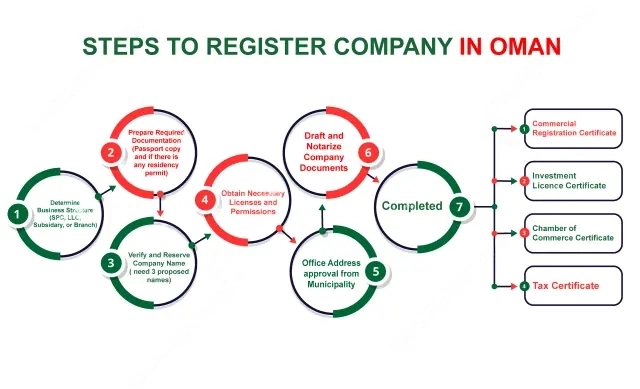
Lets dive deep into every step to register company in Oman
Step 1:
Choose the Appropriate Business Structure (SPC, LLC, Subsidiary, or Branch)
Choosing the appropriate business structure is crucial when establishing a company in Oman. The Limited Liability Company (LLC) is the most popular choice among foreign investors. Nevertheless, there are alternative options available, such as branch offices, joint ventures, sole proprietorships, and partnerships. Each of these options has its own unique implications in terms of ownership and liability.
Considerations for an LLC:
- Ownership: An LLC in Oman must have at least one Omani shareholder who owns a minimum of 30% of the shares. The remaining shares can be held by foreign investors.
- Liability: Shareholders' liabilities in an LLC are generally limited to the amount of capital they have invested in the company.
- Flexibility: An LLC provides flexibility in terms of business operations and profit distribution.
Other Business Structures:
- Branch Offices: This option is suitable for foreign companies that want to establish a presence in Oman without creating a separate legal entity.
- SPC: An SPC company in Oman refers to a Single Person Company, which allows individuals to establish and operate a business independently within the legal framework.
- Joint Ventures: These are partnerships formed between local and foreign entities for specific projects or ventures.
Steps to Selecting a Structure:
- Conduct Research and Seek Advice: Understand the consequences of each structure in terms of ownership, liability, and operational flexibility.
- Define Business Goals: Ensure that the chosen structure aligns with the long-term objectives and nature of business activities in Oman.
Key Factors to Consider:
- Local Partner/Sponsor: Identifying a suitable Omani partner or sponsor is essential for an LLC.
- Foreign Ownership Regulations: Adhere to Omani laws on foreign ownership restrictions in specific industries.
Impact on Future Business Operations:
Choosing the business structure establishes the groundwork for future actions, affecting ownership, liability, and the legal framework of the company's operations. This decision significantly influences the entire process of setting up a business in Oman.
Selecting the appropriate business structure necessitates a thorough assessment of legal, financial, and operational consequences, paving the way for a successful company establishment in Oman.
Step 2:
Compile Necessary Documentation (Copy of Passport and any Residency Permit)
Commencing the procedure for company registration in Oman requires thorough preparation of certain documents, primarily the passport copy and, if necessary, a residency permit. These papers are essential for confirming identity and obtaining legal approval.
Role of Each Document:
- Passport Copy: The passport copy serves as a primary identification document during the registration process. It is crucial to provide a clear and comprehensive copy that validates your identity and confirms your citizenship.
- Residency Permit (if applicable): Including a copy of your residency permit is vital for individuals holding Oman residency permits. This document reaffirms your legal authorization to conduct business operations within the country.
Steps to Prepare Documentation:
- Document Collection: To prepare the necessary documentation, gather a high-quality copy of your passport. Make sure that all important information, such as personal details and passport number, is clearly visible and accurate.
- Residency Permit Copy: If you possess an Oman residency permit, it is important to secure a clear copy of it. This copy will be included in the documentation set to emphasize your legitimacy to engage in business activities within Oman.
Importance of Clarity and Precision:
Regulatory Compliance: Meeting the strict compliance standards set by Omani authorities requires documentation that is both accurate and clear.
- Streamlined Registration: Well-prepared and easily readable documentation speeds up the registration process, enabling a smoother and more timely establishment of your business.
Significance of Documentation in Registration:
- Legal Verification: These documents act as legally acknowledged evidence of identity and authorization, confirming your eligibility to register a business entity within Oman's legal structure.

Step 3:
Validate and Reserve Company Name (Provide 3 proposed names)
Selecting an appropriate and distinctive name is crucial when registering a company in Oman, as it serves as a reflection of your brand and identity within the market.
Exploring the Importance of Selecting the Right Name
The process of choosing a suitable and distinctive name for your company is not just a mere formality; it holds great significance as it represents your brand, values, and market presence. In the context of Oman's business environment, it is crucial to select a name that aligns with the specific guidelines for registering a company in Oman, in order to meet legal and regulatory requirements.
Principles to Follow when Naming a Company in Oman
- Uniqueness and Differentiation: The proposed name should be one-of-a-kind and easily distinguishable from existing businesses in Oman, in order to avoid confusion among consumers and competitors
- Compliance with Regulations: It is important to ensure that the chosen name adheres to Oman's naming regulations, so as to avoid any infringement on trademarks, copyrights, or cultural sensitivities
- Relevance to the Business: Ideally, the selected name should reflect the nature, vision, or purpose of the business, in order to resonate with stakeholders and create a strong connection.
The Reservation Process Explained
The process of reserving a company name is overseen by the Ministry of Commerce and Industry. Applicants are required to submit their desired names, and the ministry carefully reviews these submissions to ensure they adhere to the regulations regarding naming.
Steps in the Reservation Process
- Application Submission: Applicants must formally submit an application to the Ministry of Commerce and Industry, stating their desired company name.
- Verification Period: The ministry conducts a thorough review of the application, which typically takes a few days. This review is done to ensure that the proposed name meets all the legal requirements.
- Approval or Adjustment: After the review, if the proposed name complies with the regulations, it is approved. However, if there are any minor discrepancies, slight adjustments may be required to ensure compliance.
Importance of Securing a Reserved Name
Securing a reserved name for a company serves several crucial purposes:
- Legal Protection: Once a name is reserved, it is protected from being used by other entities. This ensures exclusivity during the registration process and safeguards the company's identity.
- Continuity and Branding: Reserving a name allows for consistency in branding efforts. It enables marketing strategies to align with the chosen identity, ensuring a cohesive and recognizable brand image.
Navigating Naming Restrictions
- Language Considerations: It is important to ensure that names are either in Arabic or have a proper Arabic translation. If choosing to use a foreign language, it is crucial to comply with translation regulations
- Avoiding Prohibited Terms: It is necessary to steer clear of using terms that are related to government, religion, or offensive language, as they are prohibited and should be strictly avoided.
Step 4:
Obtain Municipality Approval for Office Address
Obtaining the Municipality's approval for your office address is a crucial milestone in setting up a business in Oman. It guarantees adherence to local regulations and grants the required authorization for your business premises.
- Legal Requirement: Obtaining approval from the Municipality is a mandatory step to confirm the legality of your business location in Oman
- Operational Necessity: This approval is essential for establishing your business operations at the designated address, allowing you to carry out official activities in compliance with the law.
Steps Involved:
- Selecting an Office Address: Choose a physical location for your business premises that adheres to zoning regulations and is suitable for commercial activities.
- Submitting the Application: Prepare and submit an application to the Municipality to request approval for the selected office address.
- Verification Process: The Municipal authorities will assess the proposed office address to ensure it meets zoning laws and other regulatory standards.
- Confirmation of Approval: Once the verification is complete, the Municipality will grant approval for the specified address, confirming its suitability for conducting business operations.
Office Address Selection Criteria:
- Zoning Regulations: It is crucial to select an address that complies with zoning laws, which authorize commercial activities in that specific area.
- Accessibility: The office location should be easily reachable, ensuring convenience for clients, employees, and suppliers.
Importance of Municipal Approval:
- Legitimacy and Compliance: Obtaining approval from the Municipality confirms the legitimacy and compliance of your business premises, which in turn builds trust and confidence among stakeholders.
Role of the Municipality Approval:
- Legal Authorization: The approval serves as a certification of the address's suitability for conducting business activities, enabling you to proceed with establishing your business operations at that particular location.
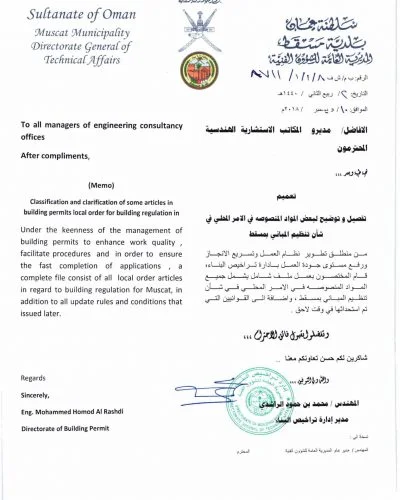
Step 5:
Secure Requisite Licenses and Permits
Exploring the complexities of this crucial phase in order to establish a business in Oman:
Understanding License Requirements:
- Tailored Licensing: Various industries in Oman have specific licensing or permit requirements that are issued by the relevant regulatory bodies.
- Compliance Mandate: Adhering to regulatory standards by obtaining the necessary licenses ensures that businesses operate within Oman's legal framework.
Steps Involved in Obtaining Licenses:
- Identification of Required Permits: Thoroughly identify and understand the licenses or permits that are essential for your specific industry
- Submission of Applications: Prepare and submit comprehensive applications to the appropriate government entities or ministries responsible for issuing the required licenses
- Evaluation and Approval: Authorities carefully evaluate applications to ensure compliance with regulations before granting approval for the licenses.
Importance of Licenses and Permissions:
- Legal Authorization: Obtaining licenses demonstrates legal approval to carry out specific business activities in Oman, indicating compliance with regulatory standards
- Industry Compliance: Licenses ensure adherence to industry-specific regulations, building credibility and trust among stakeholders
- Risk Mitigation: Properly obtaining licenses helps mitigate legal risks, preventing potential penalties or disruptions in business operations.
Regulatory Factors:
- Industry-Specific Regulations: Various sectors function within unique regulatory structures, necessitating a thorough comprehension of these intricacies to obtain licenses accurately.
- Consistent Compliance: Maintaining ongoing adherence to licensing requirements, including the timely completion of renewal procedures, is crucial for uninterrupted legal operations.
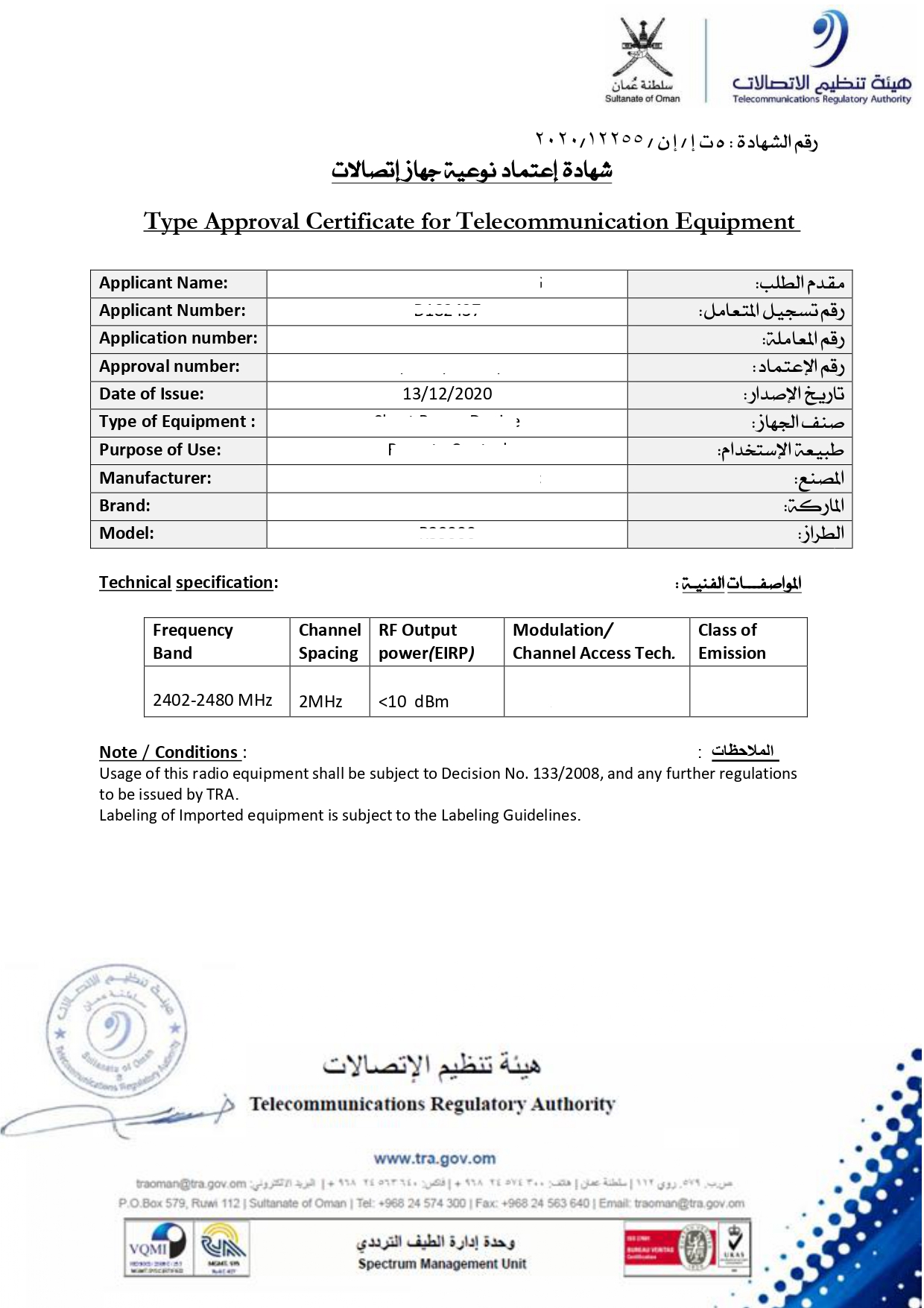
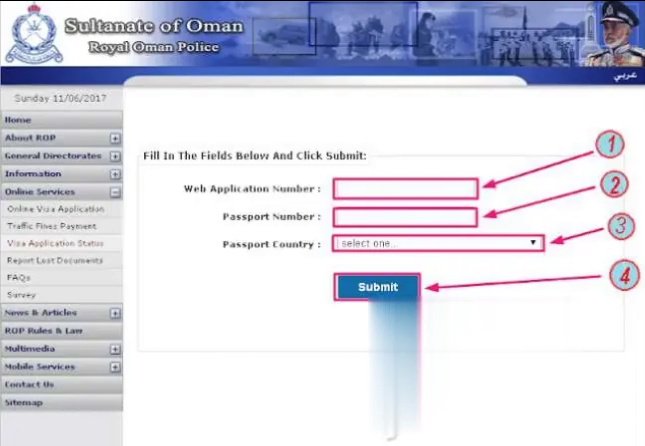
Step 6:
Draft and Authenticate Company Documents
Drafting and notarizing company documents establish the legal foundation that governs internal operations, structure, and guidelines. This crucial process guarantees transparency and adherence to regulations within the organization.
Nature and Importance of Company Documents:
- Articles of Association: This document outlines the company's goals, scope of operations, shareholder rights, and management structure
- Memorandum of Association: It contains essential information such as the company's name, location, business objectives, and initial shareholder details.
Steps Involved in Drafting and Notarizing Company Documents:
- Thorough Preparation: Carefully draft the articles and memorandum to accurately reflect the company's mission, vision, and operational guidelines.
- Legal Review: Seek legal expertise to ensure that the drafted documents comply with Omani laws, accurately represent the company's intentions, and adhere to regulatory standards.
- Notarization Process: Once drafted, these documents must be notarized by a licensed notary in Oman. This notarization certifies their authenticity, legality, and compliance with legal standards.
Significance of Notarization:
- Legal Validity: Notarization provides legal credibility and validity to the documents, making them legally binding and admissible in court, thereby reducing the likelihood of disputes.
- Clear Guidelines: Notarized documents establish a clear framework and guidelines for internal operations, minimizing misunderstandings and internal conflicts.
Compliance and Legal Clarity Focus:
- Adherence to Omani Laws: It is crucial to guarantee that company documents adhere to the legal standards set by Oman, as this establishes credibility and guarantees legal acknowledgment.
- Internal Governance: These documents act as an internal compass, outlining the company's framework, entitlements, responsibilities, and operational procedures.
Step 7:
Acquiring the Commercial Registration
- Legal Validation: Commercial Registration is a crucial process that validates and legitimizes your business in Oman, allowing it to operate within the country's commercial framework.
- Authorization for Operations: This registration confirms that your business meets all legal requirements, giving you the green light to conduct commercial activities in accordance with Omani laws.
Steps Involved In Acquiring the Commercial Registration:
- Document Compilation: Gather and present all necessary paperwork, such as the company name, shareholders' information, office location, and other essential documents, to the Ministry of Commerce and Industry.
- Application Submission: Submit a detailed application for Commercial Registration, ensuring that all documents meet the specified regulatory criteria.
- Evaluation and Approval: Authorities carefully assess the submitted documents to ensure compliance with legal standards. Once everything is in order, approval for Commercial Registration is granted.
Commercial Registration Requirements:
- Accurate Company Information: It is crucial to provide precise details about shareholders, business activities, and the registered office address to ensure a successful registration process.
- Regulatory Compliance: All submitted documentation must strictly adhere to Omani laws and regulatory standards, ensuring full compliance with the country's legal framework.
Importance of Commercial Registration:
- Legitimacy and Authorization: Commercial Registration establishes your business as a legally recognized entity, granting it the authority to engage in commercial activities, enter into contracts, and operate within the boundaries of Omani laws.
- Access to Government Services: Registered businesses gain access to a wide range of government services, making it easier to obtain permits, visas, and participate in legal transactions.
- Legal Foundation: Commercial Registration serves as the fundamental legal basis for your business, affirming its legitimacy and authorization to operate within Oman.
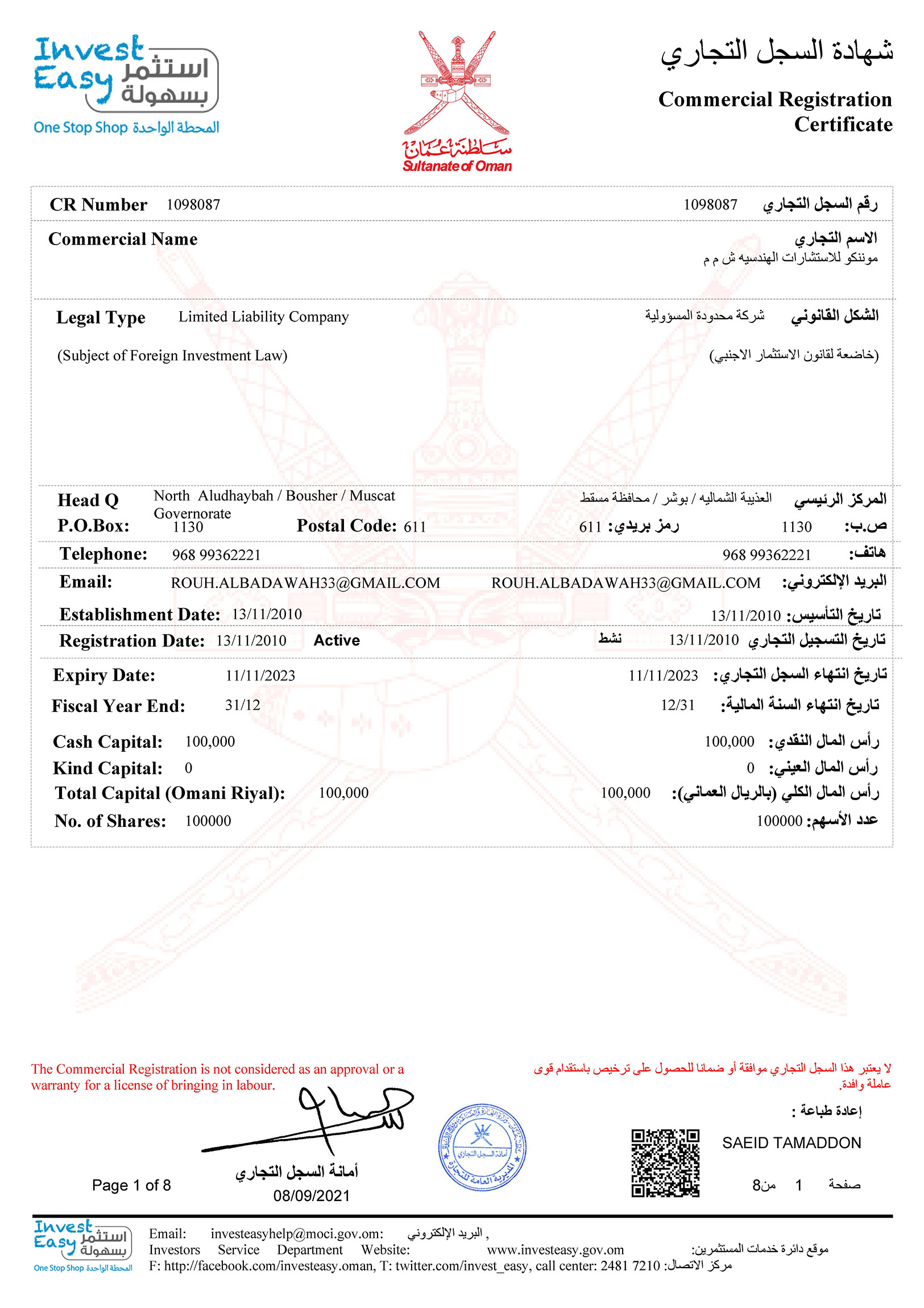
Post Registration
Obtaining the Taxation Certificate
The tax registration process is of great significance for newly formed businesses in Oman. It plays a crucial role in guaranteeing adherence to the law and financial accountability within the nation's economic framework.
Steps Involved in Tax Registration:
- Obtain a Tax Identification Number (TIN): Obtain a unique code, known as a Tax Identification Number, from the Omani tax authorities. This code is essential for identification and compliance purposes.
- Complete the Registration Process: Register your company with Oman's tax authorities by providing all the necessary documentation and information required to fulfill your tax obligations.
Tax Compliance Obligations:
- Regular Tax Filing: It is mandatory for companies to file periodic tax returns, disclosing their financial data. This ensures transparency and adherence to regulations.
- Timely Tax Payments: Companies must fulfill their tax liabilities, including corporate income tax or any other applicable taxes, within the specified deadlines.
Tax Planning and Advisory:
- Strategic Counsel: Tax advisors play a crucial role in devising strategies to optimize tax planning. They help minimize tax liabilities while ensuring compliance with legal frameworks.
- Staying Updated with Regulations: Tax advisors keep the company informed about any changes in tax laws. This ensures that the company remains compliant with the latest regulations.
Obtaining the Chamber of Commerce Certificate:
Importance of Chamber of Commerce Certificate:
- Enhanced Trade: The Chamber of Commerce Certificate plays a crucial role in boosting trade and fostering networking opportunities for your business by showcasing its affiliation with the local Chamber
- Established Credibility: This certificate adds to your business's credibility by confirming its existence and dedication to ethical business practices within Oman's commercial ecosystem.
Process Involved:
- Application Submission: Begin the process by submitting a comprehensive application to the local Chamber of Commerce, including all necessary business details and supporting documents
- Thorough Review and Validation: The Chamber meticulously reviews the application, ensuring the accuracy of the provided information. Once the application is approved, the Chamber issues the Chamber of Commerce Certificate.
Significance of the Chamber Certificate:
- Business Opportunities: The Chamber Certificate provides valuable access to a range of Chamber-sponsored events, trade forums, and networking opportunities, which can greatly contribute to the growth and development of your business through fostering collaborations and expanding trade connections.
- Enhanced Credibility: By possessing this certificate, your business gains a significant boost in credibility, which can potentially attract new clients and partners who value the trust and reliability associated with Chamber membership.
Obtaining the Investment License:
Importance of Investment License:
- Promoting Investment: The Investment License plays a crucial role in promoting and overseeing foreign investment, thereby fostering and protecting international investments in Oman
- Legal Obligation: Foreign investors are required to obtain an Investment License, which ensures legal safeguards and rights while investing in Oman.
Procedures Involved:
- Application Submission: Submit an application to either the Ministry of Commerce and Industry or the Omani Center for Investment Promotion and Export Development (OCIPED)
- Evaluation and Approval: The authorities thoroughly review the application, assessing the viability of the proposed investment project and its compliance with regulations, before granting the Investment License.
Done
Commence Business Operations in Oman
Upon finalizing all necessary legal procedures and registrations, the company is ready to commence its business operations in Oman. This stage will focus on executing and overseeing the company's activities in the market.
Operational Planning:
- Infrastructure Setup: Establish the required physical or digital infrastructure necessary for the company's operations, including office spaces, equipment, and technological systems.
- Human Resource Acquisition: Recruit and onboard essential personnel for different roles within the company, ensuring a skilled and competent workforce.
Financial Management:
- Financial Setup: Set up corporate bank accounts, manage financial resources, and implement accounting systems to monitor expenses, revenues, and financial transactions.
- Budgeting and Forecasting: Create financial plans, budgets, and future projections to direct financial activities and growth strategies.
Marketing and Sales Initiatives:
- Market Entry Strategies: Execute carefully planned marketing strategies to successfully enter the market, covering advertising, branding, and strategic positioning.
- Sales Campaigns: Initiate sales strategies and campaigns to attract customers, promoting revenue generation.
Ensuring Operational Compliance:
- Continual Regulatory Adherence: Maintain ongoing compliance with local laws, tax regulations, and industry standards to proactively address legal issues or penalties.
- Quality Assurance: Establish rigorous quality control measures to maintain product/service standards and ensure customer satisfaction.
Monitoring and Evaluation:
- Performance Tracking: Regularly monitor and assess operational performance against predetermined targets and Key Performance Indicators (KPIs).
- Adaptation and Improvement: Adjust strategies based on performance insights, consistently enhancing operations for optimal efficiency.
Risk Management Strategies:
- Risk Mitigation: Identify potential risks and devise strategies to minimize them, strengthening the company's ability to withstand unforeseen challenges.
Innovation and Growth Focus:
- Promoting Innovation: Cultivate a conducive environment for innovation to maintain competitiveness and agility in adapting to market dynamics.
- Expansion Strategies: Develop plans for future growth, considering both local expansion within Oman and exploring potential opportunities in global markets.
Embarking on business operations signifies the practical beginning of the company's venture in Oman. It requires careful planning, strategic implementation, unwavering adherence to regulations, and continuous evaluation to ensure sustainable growth and success in Oman's ever-changing business environment.
Looking for Consultant to Setup Business in Oman.
Email: info@innovativedigital.om
Contact: +968 9273 2457











